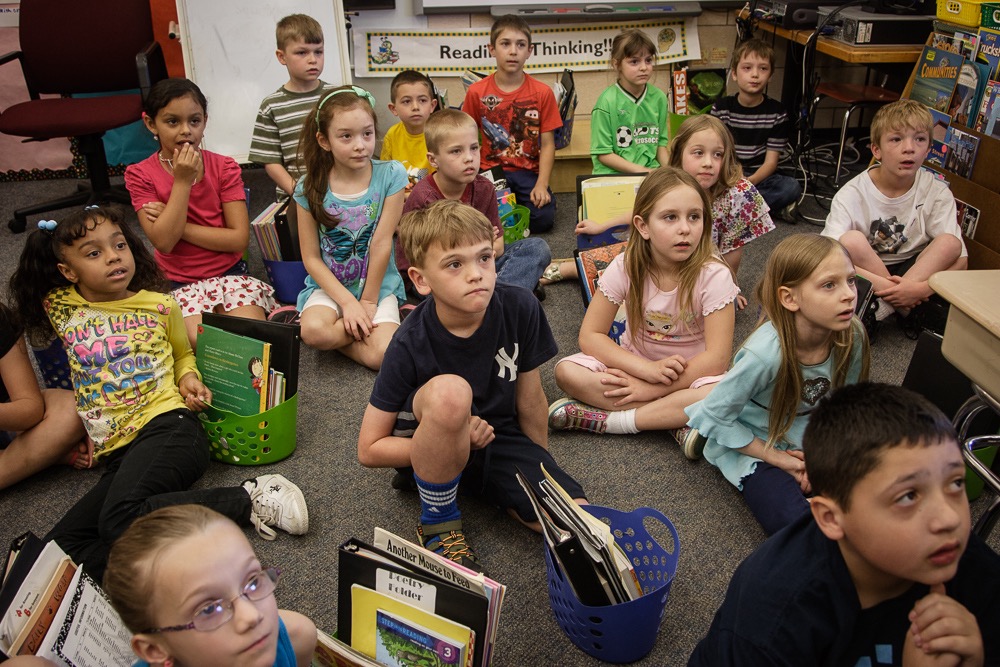Joan Moser
October 14, 2016
Issue #430
A collective gasp went up throughout the classroom of third graders as I was reading aloud the wonderful new book Two Naomis by Rhuday-Perkovich and Vernick. The room was peppered with a variety of comments, ranging from “I can’t believe they did that!” to “Oh man, that’s horrible!” The book prompted wonderful and often impromptu conversations about family, friends, and life. The story led to the class word collector being filled with numerous rich words that push vocabularies and provide the challenge of using them in writing.

The day we finished the book, I clutched it to my chest and closed my eyes in mourning. The two Naomis, whom we had come to love and with whom we had so often laughed over the past week, would no longer be part of our days. As the room grew silent, I looked around to see hands clasped under chins and eyes closed in sadness. “Now what will we do?” whispered Sonia, echoing the feelings of her classmates, who nodded.
Over the course of my lengthy teaching career, these are some of my most treasured memories: moments when our classroom community of learners had the opportunity to bond around the reading of a book that was chosen for its timely content (as with Two Naomis) and rich vocabulary. Sometimes it was about introducing students to a new author or genre, but at other times it was just about the pure joy of sharing a book together. And what about the innumerable and wistful “Remember when we read . . . ?” conversations that take place with former students in places like the school hallway—or even more joyfully, in Starbucks with your once-third-grade student who is now twenty-nine years old?
At recent summer workshops, I found myself sad and frustrated when I heard about fellow educators who are struggling with required reading lists, reduced time for reading aloud to students, and—perhaps the most shocking of all—the elimination of choice reading in school each day.
In contrast, I am encouraged by reading recent articles and posts in which other teachers, authors, and leaders in the education field have been weighing in against these setbacks. A recent New York Times article by Motoko Rich, with the headline “Study Finds Reading to Children of All Ages Grooms Them to Read More on Their Own,” explains the results of a report by Scholastic on the power of reading aloud to children and how it paves the way for more independent reading and increased vocabularies.
Irene Fountas recently published an article titled “Setting the Stage for Joy and Independence in Reading,” in which she writes about the power of getting wonderful books into children’s hands. Fountas stresses the importance of a classroom that revolves around reading, writing, thinking, and talking about books. She also emphasizes the importance of “teaching students how to select books that interest them and they can enjoy.”
Nowhere in either of these articles—or in the myriad of other books, articles, and research reports on this topic—does anyone say that we need to limit the amount of time we read aloud to children, assign them reading rather than allowing them to choose what they want to read, or have students participate in round robin reading as Russ Walsh writes about in his compelling article titled “Round Robin Reading Must Die."
Dear educators, parents, influencers, change-makers, and future-builders, stand up for what you know is right for the students in your care. Read the research and use your common sense. But also cherish the moments that find you and your students unable to speak—or even to breathe—at the end of a book, because that is what will leave the most lasting impression on your students.
News from The Daily CAFE
 Classroom Tips and Resources . . .
Classroom Tips and Resources . . .
The Power of Choice as a Classroom Management Tool*
Students learn to own their behavior and become independent problem solvers.
 Timely Ideas . . .
Timely Ideas . . .
A Culture of Thinking*
Stop the "I don't know what to write about" mind-set.
 Activities and Lessons . . .
Activities and Lessons . . .
Introduce and Use Main Idea and Supporting Details to Determine Importance
A complex strategy made understandable and useable.
 Focus on Health . . .
Focus on Health . . .
Get Quiet and Listen
Change one word and get big results.
*Available to members
Professional Development Opportunities
Professional Development Schedule Set for 2017
Online Seminars
- October 30–November 26
Graduate Course (3 credits)
Register for these courses and earn graduate credits while you learn.
- EDU 555: Launching Daily 5 and CAFE
- EDU 533: Launching Math Daily 3





